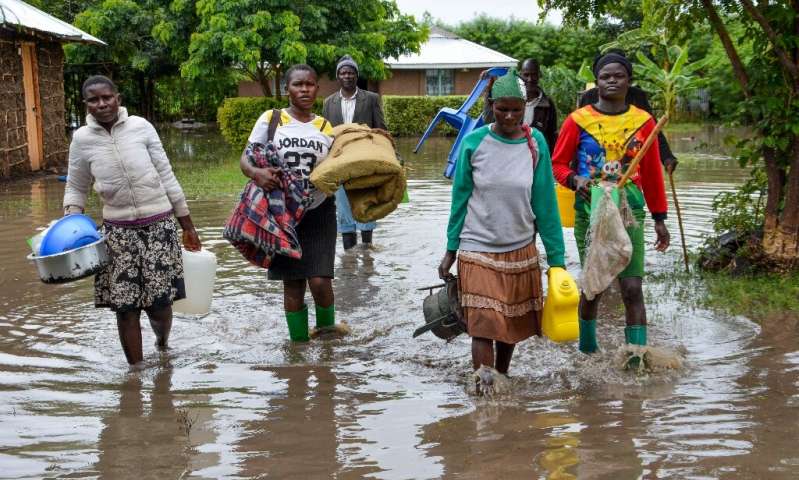
EAC Secretariat cautions Partner States on the likely impact of above normal rains in the region forecasted for June to September 2020
East African Community Headquarters, Arusha, Tanzania, 28 May 2020: According to the Greater Horn of Africa Climate Outlook Forum Statement, parts of South Sudan, Western Kenya, Uganda, Northern Tanzania and Rwanda are expected to receive above normal rainfall between June and September 2020, while the rest of the EAC Region is expected to experience the normal dry season. “It is against the backdrop of the ongoing COVID-19 pandemic, the heavy floods that have caused havoc in parts of the region and the second wave of desert locust invasion, the EAC Secretariat urges the Partner States to take appropriate measures to ward off further threats to our people” says the EAC Deputy Secretary General in charge of Productive and Social Sectors, Hon. Christophe Bazivamo.
East Africa has experienced the wettest and longest rainy seasons in history which led to an unprecedented raise in water levels of the Lake Victoria Basin and widespread landslides and floods. Many people lost their homes and livelihoods, infrastructure was damaged and trade as a consequence hampered. The Senior Meteorology Officer at the EAC Secretariat, James Kivuva, warns that “a warmer than usual season is expected in the coastal parts of the region from Kenya to Tanzania and beyond, Burundi, Rwanda, and western South Sudan, but it will be colder than usual in the central parts of Tanzania and Kenya, the eastern parts of Uganda and South Sudan and around the Lake Victoria basin”.
In an effort to prevent and mitigate the impact of the expected heavy rains in some parts of the Region, Hon. Bazivamo urges the Partner States to consider the following in their contingency plans:
- The Ministries responsible for agriculture should advice farmers on the best time to prepare for gardening against the backdrop of climate change and ensure agricultural inputs are timely availed to them.
- The Ministries of Health as well as the Ministries responsible for Agriculture and Livestock should actively monitor the disease trends in humans and animals in the affected areas.
- The Ministries responsible for Disaster Preparedness should alert the people living in flood and landslide-prone areas on the expected heavy rains and ahead of time support those, who need to relocate.
- EAC Citizens should be urged to protect themselves and especially the children against mosquito bites by using impregnated mosquito nets, personal insect repellents and avoiding outdoor activities at peak biting times of mosquitos.
- Livestock farmers should contact the veterinary services for early vaccination of animals against Rift Valley Fever (RVF) and further preventive measures against other diseases that see an increase in incidence under wet conditions.
- People in contact with ruminants should practice hand hygiene, wear gloves and other appropriate individual protective equipment when handling sick animals or their tissues or when slaughtering animals to prevent themselves for contracting possible RVF infections.
- In case of RVF outbreak, people should avoid consuming fresh blood, raw milk and meat without thoroughly roasting them;
- The Ministries of Health should intensify social mobilisation and health promotion efforts with preventive messages that enable the public to manage the risks at hand.
- The Meteorology departments should continue to monitor and analyse the weather patterns and share information with other departments to plan and prepare for outbreaks of infectious diseases of public health concern.
- The Ministries responsible for agriculture should advice farmers on the best time to prepare for their farms against the backdrop of climate change.
- The Ministries responsible for infrastructure should monitor the same for preventive maintenance to avoid devastating damage.
As we continue to respond to the prevailing COVID-19 pandemic and the weather changes notwithstanding, the EAC Secretariat encourages the EAC citizens to remain vigilant, follow the recommended physical distancing, maintain strict hygiene including washing hands with soap and water and sanitizing them, among other preventive measures.
- ENDS -
For more information, please contact:
Simon Peter Owaka
Senior Public Relations Officer
Corporate Communications and Public Affairs Department
EAC Secretariat
Arusha, Tanzania
Tel: +255 768 552087
Email: sowaka [at] eachq.org
OR
Kenneth K. Byoona
Risk Communication Advisor
Support to Pandemic Preparedness in the EAC-Region
Deutsche Gesellschaft für Internationale Zusammenarbeit (GIZ) GmbH
EAC Secretariat
Arusha, Tanzania
Tel: +255 769 137 859
Email: Kenneth.byoona[at]giz.de
About the East African Community Secretariat:
The East African Community (EAC) is a regional intergovernmental organisation of six Partner States, comprising Burundi, Kenya, Rwanda, South Sudan, Tanzania and Uganda, with its headquarters in Arusha, Tanzania.
The EAC Secretariat is ISO 9001: 2015 Certified
